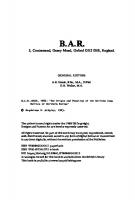The Yuezhi: Origin, Migration and the Conquest of Northern Bactria 250352429X, 9782503524290
This book provides a detailed narrative history of the dynasty and confederation of the Yuezhi, whose migration from wes
395 102 20MB
English Pages 245 [263] Year 2007
Recommend Papers

- Author / Uploaded
- Craig G.R. Benjamin
File loading please wait...
Citation preview
THEYUEZHI ORIGIN, MIGRATION AND THE CONQUEST OF NORTHERN BACTRIA
SILK ROAD STUDIES
XIV
Edited by an international committee G. GNOLI (Roma [I]) S KLJASHTORNYJ (Sankt Peterburg [CIS]) S.N.C. LIEU (Sydney [AUS]) B.A. L!TVINSKY (Moskva [CIS]) R. MESERVE (Bloomington (IN) [USA]) G. PINAULT (Paris [F]) A. SARKÖZI (Budapest [H]) N. SIMS-WILLIAMS (Cambridge & London [GB]) A. VAN TONGERLOO (Leuven [B]), Editor-in-chief S. WHITFIELD (London [GB]), Director of the Dunhuang Monograph Series P. ZIEME (Berlin [BRD])
SILK ROAD STUDIES
XIV
The Yuezhi Origin, Migration and the Conquest of Northern Bactria
Craig G.R. Benjamin
BREPOLS
© 2007, Brepols Publishers n.v., Turnhout, Belgium. All rights reserved. No part of this publication may be reproduced, stored in a retrieval system, or transmitted, in any form or by any means, electronic, mechanical, photocopying, recording, or otherwise, without the prior permission of the publisher. D/2007 /0095/17 ISBN 978-2-503-52429-0
V
Synopsis This book attempts to provide a detailed narrative history of the dynasty and confederation of the Yuezhi, whose migration from western China to the northern border of present-day Afghanistan resulted ultimately in the creation of the Kushan Empire. Although the Yuezhi have long been recognised as the probable ancestors of the Kushans, they have generally only been considered as a prelude to the principal subject ofKushan history, rather than as a significant and influential 'people' in their own right. This has partly been because the evidence for them seems so limited and ambiguous, depending in the main on almost incidental references in three ancient Chinese texts, Greek classical histories (which survive in fragments only) and the very tentative conclusions of archaeologists. None the less, it is the contention of this book that the evidence is actually surprisingly extensive and detailed, and is certainly sufficient for the compilation of a comprehensive chronological political history of the Yuezhi during the first millennium BCE. This study analyses most of the evidence currently available textual, archaeological and numismatic - in an attempt to explain the probable origin of the Yuezhi; their relationship with several Chinese dynasties; their eventual military defeat and expulsion from the Gansu by the Xiongnu; their migration through the Ili Valley, Ferghana and Sogdia to northern Bactria; and their role in the conquest ofthe former Greco-Bactria state. All of these events were bound up with broader cultural and political developments in ancient Central Asia, and if nothing else, this book hopes to show the extraordinary interconnectedness of Eurasian historical processes. The Yuezhi were weil known to a range of contiguous peoples (generally by variants of the appellation 'Tocharian') and the events in which they found themselves involved, particularly during the second century BCE, were to have a profound effect on the subsequent political, military and cultural development of much of Inner Asia. In particular the 'dominoeffect' of their migration led to significant changes in the broader Eurasian polity, affecting as it did the Chinese, Xiongnu, Wusun, Sakas, Ferghanese, Sogdians and Bactrian Greeks. These events and their consequences are all explored in some detail within the body of this book. Chapter One seeks the probable ancestors ofthe Yuezhi - the proto-Yuezhi - within the broader context of Bronze Age pastoral nomadic migrations, before considering early textual (Chinese, Indian, Greek) and archaeological evidence which suggests that the Yuezhi may have established a powerful and successful federation in presentday Xinjiang and the Gansu, based on trade in jade and horses. Chapter Two looks at events in the Gansu between 220 and 162 BCE, when the rise of the Xiongnu federation under Shanyu Maodun resulted in the defeat and expulsion of the Yuezhi. Chapter Three describes the first stage of their enforced migration to the Ili Valley, and includes a discussion of the probable fate of the Saka residents of the Ili who were in turn forced to undertake their own substantial migration to the south, perhaps as far as Kashmir. Chapter Four examines textual and archaeological evidence for the second stage of Yuezhi migration through the Ferghana and Zeravshan Valleys. Finally, Chapter Five considers the question of the disintegration of the Greco-
vi
Bactrian state, as weil as the establishment of the Yuezhi in a strong and comfortable position north ofthe Amu Darya by c. 125 BCE, when this particular study concludes. Outside of the scope of this book are the events that followed, including the crossing of the Amu Darya and settlement in Bactria proper (present-day Afghanistan) by the Yuezhi in five tribal 'yabghu' divisions. Eventually, by the mid-first century CE, the ruler of one of those yabghu - Kujula Kadphises of the Kueizhuang - went on to reunite the Yuezhi under Kueizhuang leadership and establish the Kushan Empire. lt is my hope to explore the five-yabghu period and the rise of the early Kushans in a separate study in the future. In the meantime, this book hopes to introduce the Yuezhi to the wider community of historians, and to demonstrate yet again the fundamental importance of Central Asian political and cultural processes to Eurasian and world history.
VII
Acknowledgments In the course of writing and researching this study I have benefited enormously from the advice, support and kindness of many people. Foremost amongst these is Professor David Christian, formerly of Macquarie University and now at San Diego State University. My



![The Age of Robert Guiscard: Southern Italy and the Northern Conquest (The Medieval World) [1 ed.]
0582045290, 9780582045293](https://ebin.pub/img/200x200/the-age-of-robert-guiscard-southern-italy-and-the-northern-conquest-the-medieval-world-1nbsped-0582045290-9780582045293-f-1116818.jpg)
![The Age of Robert Guiscard: Southern Italy and the Northern Conquest (The Medieval World) [1 ed.]
0582045290, 9780582045293](https://ebin.pub/img/200x200/the-age-of-robert-guiscard-southern-italy-and-the-northern-conquest-the-medieval-world-1nbsped-0582045290-9780582045293.jpg)




